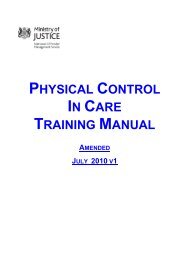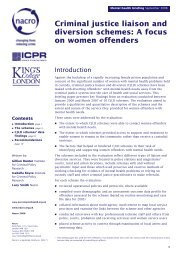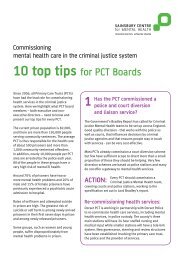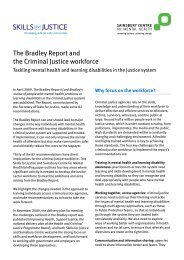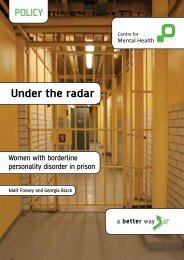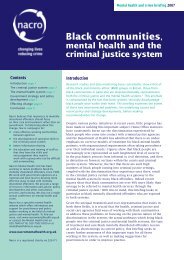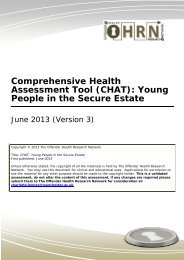Engendering Justice - from Policy to Practice - The Fawcett Society
Engendering Justice - from Policy to Practice - The Fawcett Society
Engendering Justice - from Policy to Practice - The Fawcett Society
- No tags were found...
You also want an ePaper? Increase the reach of your titles
YUMPU automatically turns print PDFs into web optimized ePapers that Google loves.
managers. “Sometimes childcare issues can be difficult<strong>to</strong> manage but I find this mostly depends on your linemanager, most are excellent but there are still others whohave a poor attitude <strong>to</strong> working women.” 199 Good flexibleworking practices are in place but these will only work inpractice if individual line managers respect and implementpolicies in order <strong>to</strong> maximise the contribution that womencan make <strong>to</strong> policing. All line managers must be trainedin responding <strong>to</strong> the needs of individuals with childcareobligations.<strong>The</strong> age old problem of child care doesn’t go away... shiftwork is difficult and on call responsibilities are hard. Youare off duty, so therefore no child care arranged, then thephone goes and you are expected <strong>to</strong> drop everything andattend callsFemale working in the Police, Questionnaire Response,December 2008Other women experienced problems returning <strong>to</strong> work<strong>from</strong> maternity leave: “Taking and coming back <strong>from</strong>maternity leave was quite hard with little support and lackof consideration especially while pregnant. Loss of skillswhilst off was not addressed on return.” 200 It is important<strong>to</strong> ensure that women returning <strong>from</strong> maternity leave areprovided with appropriate training and flexible workingsupport. Research should also be conducted in<strong>to</strong> thefeasibility of establishing a ‘bank’ of skilled officers whocould be deployed nationally <strong>to</strong> assist in time of staffshortage, due <strong>to</strong> maternity leave or gaps due <strong>to</strong> part-timeworking .201It was also apparent in evidence presented <strong>to</strong> theCommission that there are issues surrounding how parttime/flexibleworking is perceived. Care needs <strong>to</strong> betaken that policies are unders<strong>to</strong>od by all workers and thatwomen without children or men do not feel disadvantaged.As one woman commented, “In fact I believe the forcehas gone so far in the opposite direction that we are soflexible, occasionally it does become a nonsense.” 202 Acommunication strategy should be developed within allpolice forces <strong>to</strong> educate staff and officers as <strong>to</strong> the reasonsfor initiatives such as flexible working. <strong>The</strong> option of flexibleworking should also be actively promoted among malestaff.As a woman who doesn’t have children, I get frustratedwhen certain women get preferential treatment becausethey have childrenFemale working in the Police, Questionnaire Response,December 2008While the GED requires the distinct needs of women andmen <strong>to</strong> be taken in<strong>to</strong> account when developing staff policy,<strong>to</strong>o often gender equality is interpreted as requiring thetreatment of staff as ‘genderless.’ <strong>The</strong> police force uniformprovides a very clear example of this. <strong>The</strong> Commissionwas <strong>to</strong>ld in evidence that rather than police uniforms beingdesigned for male and female officers, the same maledesigneduniform, based upon a 1950s military uniform, isissued for both men and women in some forces. Given thedifferent male and female body shapes, this uniform resultsin a very uncomfortable and impractical uniform for womenofficers. Within some forces, shirts are male in design andare ordered by collar size and stab vests also have noshaping which can result in discomfort for larger women.Some forces have tailors <strong>to</strong> modify uniforms <strong>to</strong> fit officers,while other officers undertake their own alterations or put upwith wearing an ill-fitting and often uncomfortable uniform.I am a woman and it needs <strong>to</strong> be recognised, becauseI have skills as a woman that a man hasn’t got and viceversa. I don’t want <strong>to</strong> be recognised as equal, I want <strong>to</strong> berecognised for what I am and we are almost going <strong>to</strong>o farthe other way they have made us all PCs and you can’trecognise if it is a man or a woman coming <strong>to</strong> see youbecause they have changed our numbers.Respondent in study by Janet Astley on West MerciaConstabulary, February 2007<strong>The</strong> Commission is concerned at the changes whichhave been made <strong>to</strong> the selection process for promotion<strong>to</strong> Sergeant. Instead of a written exam, an area in whichwomen have excelled, there is now a work basedassessment. Promotion based on workplace assessmentis likely <strong>to</strong> disadvantage part-time workers who spendless time in the workplace. <strong>The</strong> need <strong>to</strong> spend time away<strong>from</strong> home <strong>to</strong> attend courses necessary for promotion willalso disadvantage individuals with children or other caringresponsibilities. As one woman commented:Page 69



